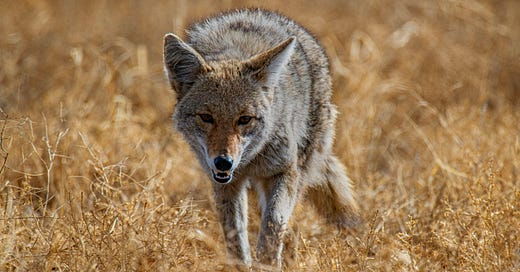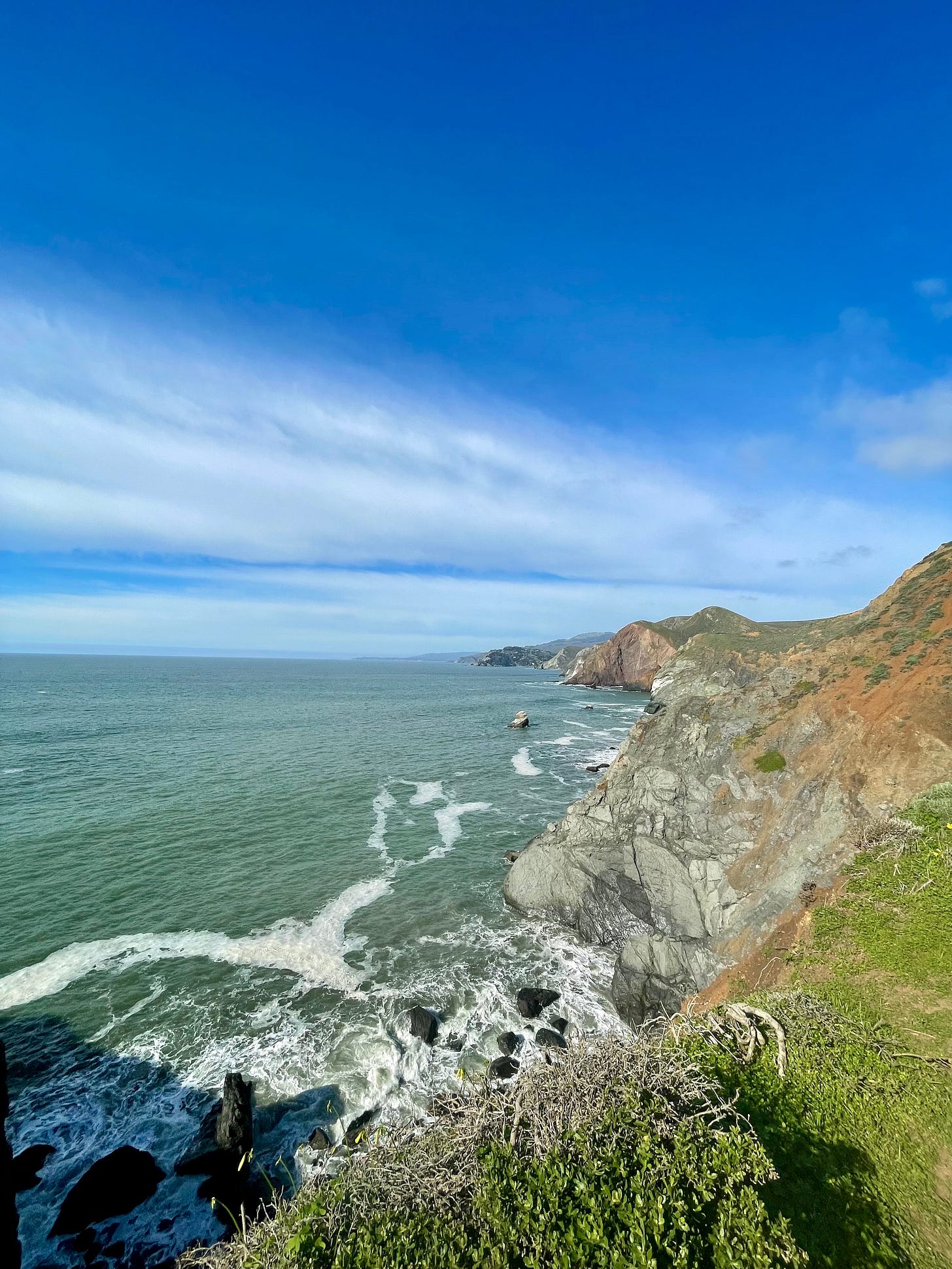When We Were Wild
An astonishing coyote encounter, the connection between wild spaces and our wild selves, and why our public lands are worth fighting for.
The coyote saw me before I saw her: long-legged, tongue lolling. A brown burst of fur against the crumbling red hills. Hunting. It was after dusk—her time to be out, not mine—and my body knew it. Breathless, I froze.
I was working as a naturalist in a National Recreation Area just outside San Francisco—a park with sheer, rocky headlands that plunged into the Pacific. Until now, I’d only ever heard her. I’d be brushing my teeth or folding socks and the howling would send me rushing to the window. I loved coyotes for the same reason some people hated them: they were wild. I was a woman in her mid-twenties who was just starting to wake up to the ways she'd been tamed—how my culture had taught me to control my body; to distrust my own knowing; to make myself small and useful; to give my power away. A wild part of me had gone missing a long time ago. I wanted her back.
That place with its dry, rocky cliffs of once-living protozoa; with its hawk migrations and wildflower blooms and coyote song. That place was showing me how to touch her again.
The coyote paused on a low hill, ears pricked in my direction. Our eyes met, and I felt a current run through me, through her. I don’t know how else to describe it. Before either of us could move, the valley burst into song, yips and howls cascading down the dusty hills. I stood there wonder-crying, silently shaking, the boundary between me and the world so thin. The coyote raised her nose to the sky and let out one plaintive, chilling howl. Then, she turned toward her pack and vanished into the fading light.
If I’ve learned one thing from my 16 years as an outdoor guide, it’s that there’s a critical connection between wild spaces and our wild selves.
We live so much of our lives not turned up. Not fully on. There are songs inside of me. There are rivers and claws and teeth. There’s a whole parallel life in which I have a child, wanted and dreamed, with hair that smells like milk and afternoon sun. There’s a meadow in me in which things like dollars and cell phones and gender don’t make any sense. There are wolves in my body, a whole pack of them, pawing the ground, sniffing the air, looking for each other, running toward what’s calling them home.
In America, we settle for scraps of wildness. Sure, there are National Parks and Forests, there are treasured public lands, but as I write this their borders are shrinking; they are being parceled up to be sold for private profit. This would not be happening if we valued our own wildness and understood the harm done when a landscape and its people are tamed. Senate republicans just proposed placing 3.29 million acres of public lands on the auctioning block—a big ol’ fuck you to wildlife, our wild selves, habitat connectivity, clean water, and places where we go to touch trees, to ride bikes, to fish and hunt and stargaze, to remember where we came from.
What happens when we forget we are all connected? When we stop tending our uncommercial, uncultivated spirit? We’re finding out right now.
But it’s not too late to come back.
It’s been fifteen years since I met that coyote, but I can still draw a line from myself back to her. Spending time in that park changed how I listened to my own instincts, how I prioritized my life. We call our modern world the “real world,” the one with screens and cars and schedules, where trips outdoors are “escapes” and “vacations,” but I have never since forgotten the real real world, the one we are all a part of, pulsing and alive, growing through the sidewalk cracks.
That same current that runs through me and the coyote runs through you, too. I’ve felt it hiking a granite ridge in the White Mountains; watching a silent snowfall in the Maine Woods; paddling the Boundary Waters; sleeping under redwoods; stargazing on an island as bioluminescence blinks around my feet. I feel it every time I step outside, even if it’s as simple as watching a bumble bee gather pollen in my housemate’s flowers, or walking through a local forest park.
I suppose my job now is to make Congress feel it. (Here’s an easy way to call your senators. Please join me.) Most days it seems like they’re too far gone, but maybe some of them aren’t. And in the words of
: “we don’t get to give up on life on Earth.”In the fight to protect America’s public lands, I hope I always remember what they are: not just a weekend getaway or a resource to be managed, but who we’re able to become when we’re there.
That wild, happy expansion. The world, calling us back to ourselves.








So much to love here. So much to share. The wild world is the real world, yes.
A beautiful, powerful piece of writing!! Each word carefully chosen so one finds themselves woven into the very fabric of your story. I am certainly well past the “wild woman”days, but can relate well to that pesky weed that rises through that crack in the sidewalk!